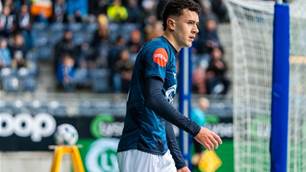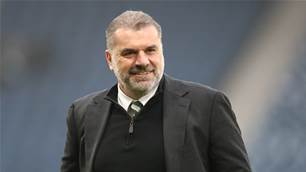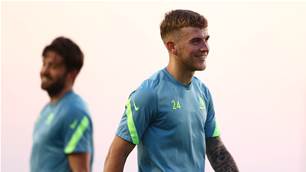The Major League Soccer season is under way, but for many, things will not get started until July and the arrival of David Beckham.
The world's most recognisable soccer player is going to America on a massive contract, potentially worth up to US dollars 250 million over five years.
For that, the league expects a substantial return. Beckham's brief is to put MLS front and centre in the US sporting consciousness.
He has already gone some way to doing that. The buzz created by his signing made MLS front-page news, and has led to a massive increase in ticket sales across the country as fans scramble to see the Los Angeles Galaxy's visit to their local club.
But the real question is whether Beckham can have a long-term impact beyond this season, and also beyond the life of his contract.
Galaxy general manager Alexi Lalas has no doubts about what he is doing.
"He is worth every penny, without a doubt," Lalas told PA Sport.
Claiming the league as a whole needed to do something "big and bold" to reach the next level, Lalas believes signing Beckham was a 'no-brainer'.
"You can't get any bigger than David Beckham," he said. "You have to pay for it, but the international attention that the Galaxy have got and the league has got is unprecedented.
"The deal is unprecedented in the world of sports and it reflects the iconic stature of David Beckham and what we feel he's going to do for us as a soccer player and as an ambassador for the game."
Beckham will not be alone. His arrival has been facilitated by the new designated player rule which allows clubs to break their salary cap for one chosen player.
Mexican star Cuauhtémoc Blanco will ply his trade in Chicago, while the Red Bulls, who traded with Kansas City to acquire a second designated player spot, are employing former Premiership stars Claudio Reyna and Juan Pablo Angel this season.
But amid the influx of foreign talent, MLS is determined not to repeat the mistakes of the North American Soccer League, which famously shipped in the likes of Pele, Franz Beckenbauer and George Best during the 1970s, only to fail in bankruptcy as the novelty wore off.
Unlike the NASL, MLS is starting from a position of strength. The league has enjoyed rapid growth in its first 11 years, establishing relatively small but strong pockets of support in its host cities.
The focus on having teams build their own soccer-specific stadiums continues to bear fruit, adding revenue and credibility to those clubs who have taken the plunge.
Last summer, before Beckham's name had even appeared in the gossip columns, the league signed the biggest television rights deal in its history, an eight-year contract with ABC/ESPN which will see the league turn a profit on its rights for the first time.
Expansion continues apace. Toronto FC joined the league this season and there is a queue of cities - the likes of Atlanta, Seattle, Miami, St. Louis, Philadelphia and the Bay Area included - competing to win one of three more franchises set to be created in the next three years.
The league has come a long way in a short space of time as Lalas - a player in the inaugural season - knows as well as anyone.
"It was the Wild West there for a while," he said of the first year of MLS in 1996.
"The progress that has been made is unprecedented in terms of how dramatic and sudden the improvement has been."
That growth is what gave the league the confidence to aim for the next level.
Beckham's signing is a multi-million dollar gamble, but not one taken lightly. Competing on a sporting landscape dominated by the NFL, baseball and the NBA, MLS had to do something radical to boost its profile.
It will never overshadow those more established leagues, but it can take its place alongside them.
And in the wider soccer world, Lalas believes the US can become a major power.
"It's going to take a lot of work," he said. "But at some point I want to reach the day where a kid in Europe, when they think about the world's best teams, they will think about Real Madrid and Manchester United, but also the Galaxy."
For that, the league expects a substantial return. Beckham's brief is to put MLS front and centre in the US sporting consciousness.
He has already gone some way to doing that. The buzz created by his signing made MLS front-page news, and has led to a massive increase in ticket sales across the country as fans scramble to see the Los Angeles Galaxy's visit to their local club.
But the real question is whether Beckham can have a long-term impact beyond this season, and also beyond the life of his contract.
Galaxy general manager Alexi Lalas has no doubts about what he is doing.
"He is worth every penny, without a doubt," Lalas told PA Sport.
Claiming the league as a whole needed to do something "big and bold" to reach the next level, Lalas believes signing Beckham was a 'no-brainer'.
"You can't get any bigger than David Beckham," he said. "You have to pay for it, but the international attention that the Galaxy have got and the league has got is unprecedented.
"The deal is unprecedented in the world of sports and it reflects the iconic stature of David Beckham and what we feel he's going to do for us as a soccer player and as an ambassador for the game."
Beckham will not be alone. His arrival has been facilitated by the new designated player rule which allows clubs to break their salary cap for one chosen player.
Mexican star Cuauhtémoc Blanco will ply his trade in Chicago, while the Red Bulls, who traded with Kansas City to acquire a second designated player spot, are employing former Premiership stars Claudio Reyna and Juan Pablo Angel this season.
But amid the influx of foreign talent, MLS is determined not to repeat the mistakes of the North American Soccer League, which famously shipped in the likes of Pele, Franz Beckenbauer and George Best during the 1970s, only to fail in bankruptcy as the novelty wore off.
Unlike the NASL, MLS is starting from a position of strength. The league has enjoyed rapid growth in its first 11 years, establishing relatively small but strong pockets of support in its host cities.
The focus on having teams build their own soccer-specific stadiums continues to bear fruit, adding revenue and credibility to those clubs who have taken the plunge.
Last summer, before Beckham's name had even appeared in the gossip columns, the league signed the biggest television rights deal in its history, an eight-year contract with ABC/ESPN which will see the league turn a profit on its rights for the first time.
Expansion continues apace. Toronto FC joined the league this season and there is a queue of cities - the likes of Atlanta, Seattle, Miami, St. Louis, Philadelphia and the Bay Area included - competing to win one of three more franchises set to be created in the next three years.
The league has come a long way in a short space of time as Lalas - a player in the inaugural season - knows as well as anyone.
"It was the Wild West there for a while," he said of the first year of MLS in 1996.
"The progress that has been made is unprecedented in terms of how dramatic and sudden the improvement has been."
That growth is what gave the league the confidence to aim for the next level.
Beckham's signing is a multi-million dollar gamble, but not one taken lightly. Competing on a sporting landscape dominated by the NFL, baseball and the NBA, MLS had to do something radical to boost its profile.
It will never overshadow those more established leagues, but it can take its place alongside them.
And in the wider soccer world, Lalas believes the US can become a major power.
"It's going to take a lot of work," he said. "But at some point I want to reach the day where a kid in Europe, when they think about the world's best teams, they will think about Real Madrid and Manchester United, but also the Galaxy."
Copyright (c) Press Association
Related Articles

Emerging Socceroos star set to sign for MLS club

Postecoglou set to sign Socceroo at Celtic FC













